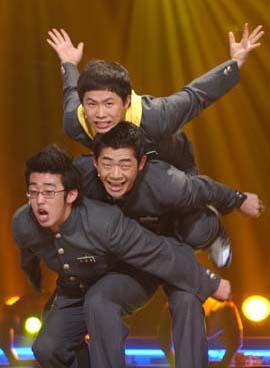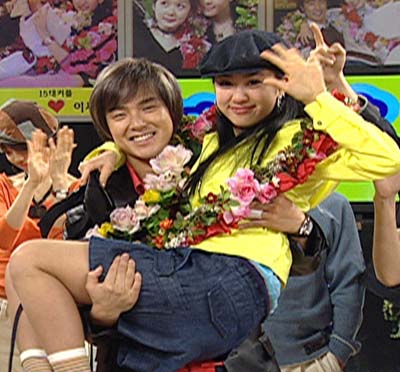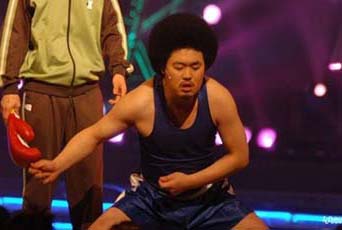An average of 3 hours per day, for about 10 years during your life time. 10 years is not a short term. You can be a millionaire and a CEO if you try your best during that time. But you spend that time watching TV.

Yes, we university students sure spend much time just watching TV. And you can find the influence of TV around us easily. When you go to orientation meetings, you have the chance of seeing many students present their individual skills. But their individual skills are limited to 'Gag Concert' or 'People who find smiles'. And usually many games are related to 'the corner X man' or 'well-matched couple' of Kang Ho-dong. Even though the programs above have been very popular, isn't it too monolithic? What do we acquire from investing our precious ten years in watching TV?
Mainly, we have fun by watching TV. Also we can get ideas from it, such as the parody of 'Hwasang high school'. According to a survey about the variety of TV culture (2004.11.26), the programs which university students preferred are primarily soap operas (48.9%), and entertainment programs (51.1%). We can infer that our watching habit is inclined toward 'fun'. We have a very limited selection of TV programs.
And when we think of our own TV programs (that is to say, TV programs for university students), we don't have any. We usually enjoy soap operas or entertainment shows for teenagers. We are university students who have keen criticism and open-minded thoughts. But we often just sit and watch TV without any thoughts, like we did at a young age.

Moreover, for a long time university students on TV seemed as the image of free people who spend most of their time indulging in love affairs. For example, 'Survival Meeting' (1999), 'Campus Music Video' (1999), 'Hurray for Love Affairs' (2002), famous for normal female university students dating male entertainers, and 'War of Roses' (2002). These programs were criticized for their emphasis on appearance for girls, and on academic cliques for boys. Also, many producers preferred university students because of their freshness and low costs. Even though their image was manipulated, it's true that we don't have any ideas about that. But, all of you know the great influence of TV. TV is one of mass communications which we can see and listen to simultaneously. We have the tendency to believe facts on TV easily; Seeing is believing'. Considering its strong effect, it's time to show our healthy power.
We don't always play games and drink alcohol. Romantic stories are limited to only some students. We sometimes stay up all night for the mid term exams and think seriously about our future. We also have concerns about society and try to solve many problems. Then how can we show our healthy thoughts through TV?
You guys have no control of schools or parents. You have time for the TV studios whenever you like. If you have great concern for social problems, you can participate in TV discussions like 'Live Night Discussion (KBS1)' or '100 minute- discussion' (MBC). And when you want to boast your knowledge, consider 'Quiz Show Best Men and Women (SBS) and 'Quiz Republic of Korea' (KBS1).
And before we point out the lack of programs for university students, we need to strengthen our power. We have to expand our positive thoughts, showing a good opinion on various problems through participating in the TV programs above. At that time, producers would be interested in making programs which university students would make by themselves. It would be a good idea because this sort of program will contain a fresh and perspective about us, and will be different from former artificial and stimulated programs
There is an NGO named 'pop culture monitoring group of Korean university students'. It was created in 1995. University students in Seoul mainly joined this group and about 50 students have performed great activities in various areas. "Even though our power is slight, our vivid experience and creative opinions are strong points we have." said Oh Jung-taek, a member of the group in an interview with 'Ewhadew'. They usually monitor every section relating to pop culture like TV, movies and so on. They also have regular seminars to see the mass media critically and select good programs. And they inform the results of the monitoring related to the organization. This NGO activity can be a good example of feedback our opinions. We should increase this kind of 'two way - communications'.

Kim Kyo-in (Children welfare, 03) said, "I don't watch 'People who find smiles'. But when I went to the MT, many freshmen showed their individual skills copying from 'Hwasang high school'. At that time, I felt some kind of isolation. After the experience, I wanted the program every time." Almost everyone has the same experience. But besides 'People who find smiles', we have a lot of programs to watch and participate in. We are the main characters in pop culture. Let's stop being passive spectators and be active players instead. We can make and lead the pop culture critically and in a better way. If anyone is watching a TV discussion now, just log onto the internet and apply for participation right now!
By Kim Moon-sun
Culture reporter
HERALD
webmaster@herald.cau.ac.kr

